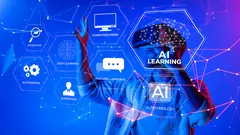206
5
3 minutes
Suggested Articles

Generalist AI is revolutionizing daily life and powering a new tech era
Discover the stunning advancements and future trends in generalist AI technologies. Learn how breakthroughs in artificial intelligence are shaping everyday life, impacting industries, and redefining technology in the United States.

How AI and Micro-Credentials Are Reshaping Future Careers in Tech
AI & Everyday Tech

AI coding assistants like Copilot and ChatGPT are transforming developer workflows
AI & Everyday Tech

AI myths debunked: The real magic behind artificial intelligence revealed
AI & Everyday Tech

Unlock Powerful Productivity and Reclaim Your Time With Smart AI Tools
AI & Everyday Tech

AI Website Builders Are Revolutionizing Web Design and Development
AI & Everyday Tech

AI Spell Checkers Are Quietly Revolutionizing How We Write Every Day
AI & Everyday Tech

Tech innovators embrace generative AI as OpenAI challenges Google with smarter search
AI & Everyday Tech

GPT-5 is about to redefine AI with game-changing human-like abilities
AI & Everyday Tech

Unlock Your Productivity and Privacy With a Local AI Assistant on Your PC
AI & Everyday Tech

Playing video games together strengthens relationships and sparks real connection
AI & Everyday Tech

US crypto pioneers transform bold risk into life-changing fortunes
AI & Everyday Tech

Tech leaders embrace waste-to-carbon solutions as Microsoft bets big on green AI
AI & Everyday Tech

Travelers and campers embrace portable backpack laundry tech for freedom and clean clothes anywhere
Gadgets & Reviews

Sleep experts champion a smart anti-snoring belt for restful nights and healthier mornings
Gadgets & Reviews

Drivers use Google Maps and Waze to avoid fines but risk safety trade-offs
AI & Everyday Tech

App lovers seize this week’s best free premium downloads before time runs out
Smartphones & Apps
 W3 CodeCraft
W3 CodeCraft

Comments